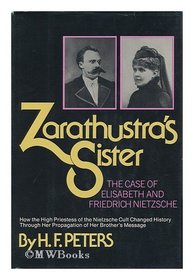Search -
Zarathustras Sister
Zarathustras Sister
Author:
From inside flap: — The case of Elisabeth and Friedrich Nietzsche — How the High Priestess of the Nietzsche Cult changed history through her propagation of her brother's message. — by H.F. Peters — Illustrated — A woman whose manipulations were worthy of Machiavelli, Elisabeth Nietzche used her position as the sister of one of Germany's greatest phil... more »
Author:
From inside flap: — The case of Elisabeth and Friedrich Nietzsche — How the High Priestess of the Nietzsche Cult changed history through her propagation of her brother's message. — by H.F. Peters — Illustrated — A woman whose manipulations were worthy of Machiavelli, Elisabeth Nietzche used her position as the sister of one of Germany's greatest phil... more »
ISBN-13: 9780517527252
ISBN-10: 0517527251
Publication Date: 12/12/1988
Pages: 243
Rating: ?
ISBN-10: 0517527251
Publication Date: 12/12/1988
Pages: 243
Rating: ?
0 stars, based on 0 rating
Publisher: Random House Value Publishing
Book Type: Hardcover
Members Wishing: 0
Reviews: Amazon | Write a Review
Book Type: Hardcover
Members Wishing: 0
Reviews: Amazon | Write a Review
Genres:
- Biographies & Memoirs >> General
- Biographies & Memoirs >> People, A-Z >> ( N ) >> Nietzche, Friedrich
- Biographies & Memoirs >> Memoirs
- Nonfiction >> Philosophy >> General
- Nonfiction >> Philosophy >> Modern




